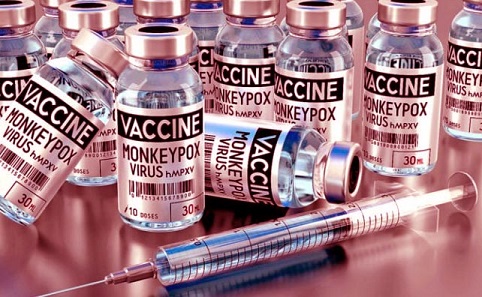Norwegian doctors warn that Mpox vaccines can cause Generalized Pustular Psoriasis in some!
Nikhil Prasad Fact checked by:Thailand Medical News Team Aug 18, 2024 1 year, 1 month, 4 weeks, 22 hours, 6 minutes ago
Mpox News: Recent findings from Norwegian researchers have raised concerns about a possible link between Mpox (monkeypox) vaccination and the onset of a severe skin condition known as generalized pustular psoriasis (GPP). The study, conducted by experts from Oslo University Hospital and the University of Oslo, highlights a rare but serious adverse reaction that can occur following vaccination. This
Mpox News report delves into the case study and explores the implications of these findings.
 Norwegian doctors warn that Mpox vaccines can cause Generalized Pustular Psoriasis in some!
Understanding Generalized Pustular Psoriasis
Norwegian doctors warn that Mpox vaccines can cause Generalized Pustular Psoriasis in some!
Understanding Generalized Pustular Psoriasis
Generalized pustular psoriasis (GPP) is a rare and life-threatening variant of psoriasis. Unlike the more common plaque psoriasis, GPP is characterized by widespread pustules, fever, and systemic symptoms that can lead to severe complications if not treated promptly. The condition is often triggered by factors such as infections, stress, and, in some cases, vaccinations. GPP can be challenging to diagnose due to its clinical and histological similarities with acute generalized exanthematous pustulosis (AGEP), another severe skin condition.
The Case Study: A Concerning Development
In this article, the researchers describe a case involving a man in his thirties, who, despite having a well-controlled Human Immunodeficiency Virus (HIV) infection, developed generalized pustular psoriasis shortly after receiving the Mpox vaccine.
The patient had no prior history of psoriasis or other skin conditions, making this case particularly alarming. Seven days after receiving the vaccine, he began to develop a rash that rapidly progressed to include widespread pustules, fever, and systemic symptoms, leading to his admission to the hospital.
Initially, the medical team suspected an infection caused by the Herpes Simplex Virus (HSV) type 2, which was detected on the patient's skin. He was treated with intravenous antiviral and antibiotic medications, but his condition did not improve. Further tests ruled out other infections, and as his symptoms persisted, the diagnosis was reconsidered.
Diagnosis and Treatment Challenges
The overlapping symptoms of AGEP and GPP created a significant diagnostic challenge for the medical team. The initial diagnosis leaned towards AGEP; a delayed hypersensitivity reaction that typically resolves once the offending drug is discontinued. However, when the patient did not respond to standard treatments, including topical corticosteroids and acetaminophen, the possibility of GPP was considered. This led to a comprehensive reassessment, including skin biopsies, which revealed characteristics consistent with GPP.
The patient's condition was further complicated by a lack of response to acitretin, a common treatment for GPP, due to a subsequent elevation in liver enzymes. The medical team then explored alternative treatment options, eventually administering intravenous spesolimab, an interleukin-36 (IL-36) inhibitor recently approved for GPP.<
;br />
The Breakthrough with Spesolimab
The administration of spesolimab marked a turning point in the patient's treatment. Within days of receiving the infusion, his symptoms began to improve significantly. The patient's GPP Physician Global Assessment (GPPGA) score, which measures disease severity, dropped from 3 to 1, while his Dermatology Life Quality Index (DLQI) score, reflecting his quality of life, improved from 30 to 4. Encouragingly, the patient remained in remission for eight months following treatment and was able to return to work with no recurring symptoms.
The Implications of the Findings
The findings of this case study underscore the potential risks associated with Mpox vaccination, particularly for individuals who may be predisposed to psoriasis or other autoimmune conditions. While GPP is rare, the possibility of its occurrence as a vaccine side effect warrants further investigation. The researchers emphasized the need for healthcare providers to be aware of this potential risk, especially in patients with underlying conditions such as HIV.
Moreover, the study highlights the effectiveness of spesolimab in treating GPP, offering hope for patients who develop this severe condition. The rapid improvement observed in this case suggests that spesolimab could become a crucial part of the treatment regimen for GPP, particularly in cases where traditional treatments are ineffective or contraindicated.
Conclusion
This study serves as a reminder of the complex and sometimes unpredictable nature of vaccine-related adverse events. While vaccines play a critical role in preventing infectious diseases, it is essential to monitor and address any potential side effects, particularly those that could lead to serious health complications. The successful treatment of GPP with spesolimab offers a promising avenue for managing this challenging condition, but further research is needed to fully understand the mechanisms behind vaccine-triggered psoriasis.
The study findings were published in the peer-reviewed journal: JEADV Clinical Practice.
https://onlinelibrary.wiley.com/doi/epdf/10.1002/jvc2.493
For the latest
Mpox News, keep on logging to Thailand Medical News.
Read Also:
https://www.thailandmedical.news/news/scientists-finds-monkeypox-virus-in-semen-of-infected-men-even-weeks-after-first-symptom-appears-doctors-warn-infected-can-have-eye-issues-and-become-
https://www.thailandmedical.news/news/mpox-monkeypox-can-also-cause-vascular-inflammation-and-affect-cardiovascular-health
https://www.thailandmedical.news/news/monkeypox-mpox-can-cause-a-variety-of-eye-issues-that-can-result-in-vision-loss
